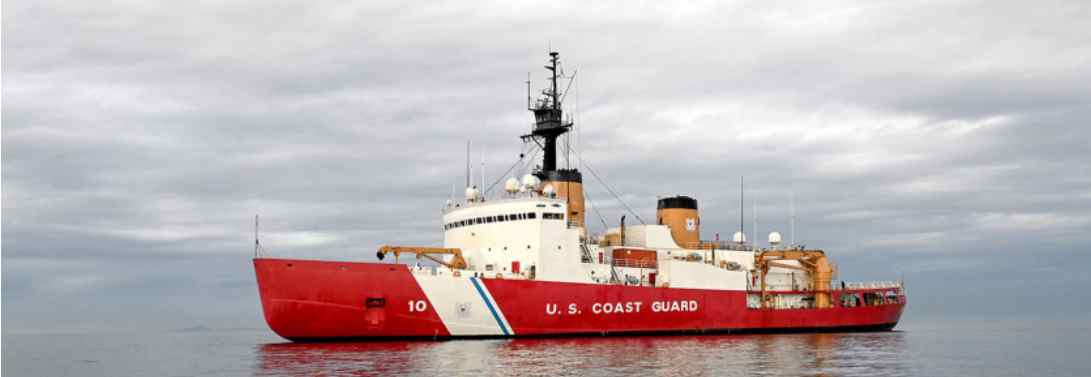WASHINGTON, D.C. – U.S. Senator Maria Cantwell (D-WA) and U.S. Senator Mark Begich (D-AK) introduced a bipartisan amendment last week that would pave the way for the construction of new Coast Guard heavy polar icebreakers.
The icebreaker language was introduced as an amendment to the National Defense Authorization Act for Fiscal Year 2013 (S.1197) currently under consideration in the Senate.
Under the amendment, the Navy would construct up to four heavy icebreakers, and then enter into a Memorandum of Understanding with the Department of Homeland Security to transfer the vessels to the Coast Guard. The Coast Guard is the sole service responsible for icebreaking missions.
The United States currently has only two operational icebreakers, the Healy and the Polar Star. The Polar Star is currently in Seattle preparing to depart on December 3rd for Antarctica after years of extensive retrofitting.
“The Nome fuel crisis several years ago demonstrated the need for enhanced icebreaking capability to meet the needs of residents of America’s Arctic as well as our nation’s security needs,” said Senator Begich. “The U.S. is an Arctic nation with national security concerns in the region, particularly as the ice melts and we have greater energy and shipping capabilities, which is exactly why I have joined my colleagues to introduce this amendment to the National Defense Authorization Act and will continue to push for broad support for this measure in the Senate.”
“With Defense Secretary Hagel announcing last Friday that the nation’s military will be very involved in the Arctic region, moving forward towards an Arctic future means icebreakers; this bill would help deliver on that,” said Senator Murkowski. “The Arctic nations are investing in the future to maximize the emerging opportunities there – Russia has 33 icebreakers while we have 2 at best – and even India and China are seeing the need for icebreakers to gain entry to this newly-accessible region. The Coast Guard’s own study showed they needed 10 icebreakers to fulfill their duty in northern waters, so I appreciate this bipartisan effort with the Washington delegation in order to protect our waters and remain at the table in pushing ahead in the Arctic.”
“Icebreakers protect America’s Arctic interests and support Washington state shipbuilding jobs,” said Senator Cantwell. “The Arctic continues to open up, creating new routes for commerce and trade— which is why other nations are acquiring new icebreakers. This amendment is an important step forward to ensure the Coast Guard has the tools it needs to secure our interests and win the race to the Arctic. Our bipartisan effort will help meet our national security priorities in the region and support new jobs in America’s shipyards while solidifying Washington state’s position as our national hub for Arctic commerce and maritime manufacturing.”
“Building a fleet of state-of-the-art Icebreakers is critical to our national security and our economic interests, and we can’t fall behind our global competitors who are taking Arctic commerce seriously,” said Senator Murray. “Construction of up to four new icebreakers would be a boon to Washington state’s maritime manufacturing industry, and the security and economic impacts would benefit Americans everywhere.”
In a new report released last week, Seattle’s maritime economy is worth $30 million a year and supports more than 148,000 jobs. A key part of that commerce is due to Seattle’s position as a national hub for Arctic commerce and maritime manufacturing. The Coast Guard’s icebreaker fleet is based and serviced in Seattle. Refurbishing a large icebreaking vessel like the Polar Star can take roughly five years and employ upwards of 300 workers. Building a new vessel can take eight to ten years and employ more than 1,000 workers.
As the world saw in 2012 when the Healy cut a path through Arctic sea ice to the town of Nome, Alaska, icebreakers fill a unique and vital role in the nation’s safety, security and environmental operations at sea. The Coast Guard needs a minimum of six heavy duty icebreakers and an additional four medium icebreakers to meet Coast Guard and Navy mission requirements, according to a recent Coast Guard study. The United States Navy has no icebreaking capability.
The melting polar ice cap has opened new passageways through the Arctic ice and created new opportunities for trade and international commerce. Emerging resource development in the Arctic is also bringing up additional environmental concerns and increasing the importance of vessels capable of operating in sea ice. Icebreakers are also key for scientific research critical to understanding global climate change. Historically, these vessels have also helped resupply the McMurdo Station, the main U.S. station in Antarctica on the southern tip of Ross Island. However over the last few years the United States has been forced to contract foreign icebreaking to deliver supplies to the station.
The Washington and Alaska delegations have a history of working together to preserve and upgrade the nation’s icebreaker fleet. On June 15, 2012, Senators Cantwell, Begich and Murkowski announced an agreement with the U.S. Coast Guard to postpone the scheduled scrapping of the Polar Sea through the end of the year.
The agreement was reached during a meeting between them and the Commandant of the U.S. Coast Guard, Admiral Robert Papp, Jr. Cantwell and Begich’s legislation to stop the decommissioning or scrapping of the Polar Sea was signed into law by President Obama on December 20, 2012.
Cantwell and Begich were instrumental in securing the language in the 2010 Coast Guard Reauthorization Act that required the Coast Guard to evaluate the costs and benefits of building new vessels versus refurbishing the existing vessels, in order to save taxpayer dollars.
As a senior member of the Appropriations Committee, Murray has secured federal funding in homeland security appropriations bills for the retrofitting of the Polar Star heavy icebreaker. Retrofitting the Polar Star was competitively awarded to Seattle’s Todd Shipyards in 2008 and has been estimated to create or sustain more than 250 jobs in the Puget Sound region.
On August 18, 2011, Cantwell and Begich urged the Coast Guard to postpone decommissioning the Polar Sea until a business analysis could be completed to determine the most cost-effective way to revitalize the nation’s aging polar icebreaker fleet. In a letter sent to Admiral Papp, the Senators said the lack of icebreaking capacity was unacceptable.







